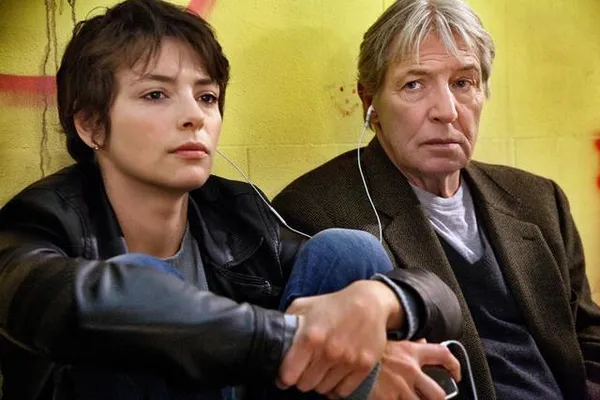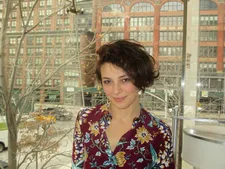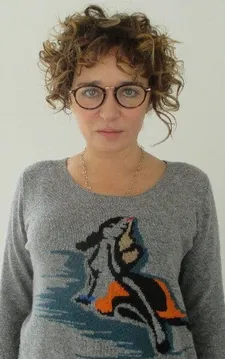 |
| Jasmine Trinca and Carlo Cecchi as Honey and Grimaldi in Miele. "It's very interesting how Valeria used music. It is not at all a score." |
Honey is played with subtle layers of emotion by Jasmine Trinca who gives the character a searching physicality and the strength of appetite to move forward. We get to glimpse into the life of a young woman who has created a world of rituals for herself. Honey's job is to provide aid to the terminally ill to end their life with dignity.
In New York, Jasmine and I discussed the difference in opportunities for women versus men in Italian cinema, the choice of roles offered, how she found the character of Honey through movement and by dressing in "uniforms".
Anne-Katrin Titze: How did you become involved in Honey?
Jasmine Trinca: Four years ago I was in a fashion show with Valeria and I used to have very long hair. At the fashion show she looked at me and she told me "will you cut your hair for me?" I didn't understand why. Maybe one year later she was telling me about the movie [she was planning] and the book. It was a very beautiful but tough one. A hard story. But in Italy it's not usual for an actress to find roles like Honey. Normally, I am a girlfriend or a daughter, no? Everything is very flat.
AKT: This is an issue in general.
JT: In general about roles but in Italian cinema, it's more focused on men.
AKT: Women as a side attraction.
JT: Yes, to tell something about the man.
AKT: And embellish as arm candy. Honey is really the opposite.
 |
| Jasmine Trinca on Honey in Valeria Golino's film: "Once her solitude meets another solitude, because Grimaldi (Carlo Cecchi) is alone, they become something." Photo: Anne-Katrin Titze |
AKT: It is also a very physical performance. You say boyish and invisible and on the other hand she wears baby-blue nail polish on her toes.
JT: Yes, very fashionable. That was Valeria's touch!
AKT: How did you see the unusual relationship with Grimaldi (Carlo Cecchi), the old man?
JT: Valeria told me this is not at all a father-daughter relationship. For me they are in love in a strange way. This isn't a love story.
AKT: He listens to her more than anyone else in her life?
JT: I think that Honey becomes human. She starts from a very strange state that as not human. To do what she does, she can't be really human, otherwise she couldn't do that.
AKT: The first time we see your character at work, you are standing next to a religious painting of the Virgin Mary. Dressed in a collared shirt and latex gloves, you become an angel of death, of sorts. In my conversation with Valeria, I called you the butler of death.
JT: Exactly. It's like a uniform. And once her solitude meets another solitude, because Grimaldi is alone, they become something. They are not friends, they aren't in love, they meet each other. At this point, she can't do her work because she becomes human, because she sees someone in the world.
AKT: Honey swims in the ocean and fervently rides her bike. Could you relate to her physical being in the world?
JT: I love this. I'm very physical. I prefer to express things with the body, rather than words. Otherwise, silence.
AKT: The spectator does not need a lot of background. You show who she is by her physical actions.
JT: In real life, I am different. Valeria asked me to find a tension to move in this way. To burn. To eat life.
AKT: Honey is also often seen eating. Not for taste, it seems more like fuel.
JT: Also the sex scenes have a lot of movement. Maybe she doesn't have to think about things. In a way she is escaping from…
AKT: Contact?
JT: Yes, also her relationships. Before Grimaldi they are very superficial. Surface. I think it's very important for the character the specific indication she gave me. Move, just move! I loved to swim and ride the bicycle. I think it's important. Also the look took me in another direction.
AKT: You cut your hair very short right before shooting?
JT: Yes. And I had a uniform. For work and also [outside] that black leather jacket. Something that helped me find a way into her.
AKT: Did you listen to music on your iPod? Music is used by Honey as part of her job.
 |
| Honey director Valeria Golino: "Valeria asked me to find a tension to move in this way. To burn. To eat life." Photo: Anne-Katrin Titze |
AKT: And you provide it for them.
JT: It's not something that guides us in an emotion. It's something real inside the movie. And the choice was wonderful for me.
AKT: When did you first read A Nome Tuo by Mauro Covacich, which the film is based on?
JT: The summer before, maybe a month before shooting. But I wasn't cast. I think she met with all the Italian actresses between 20 and 30. I wasn't sure. I read the book and it was at a personal moment in my life, very tough, something about illness and pain. So it wasn't easy and at the same time, I think, being Honey helped me. I don't think it's a movie about death, it's a movie about life. It's movement. If we talk about life we also have to talk about the end of life. For me it was the same.
AKT: We are born and we start dying.
JT: Yes. It helped me to understand that there isn't only the end of life. It was like analysis.
AKT: I loved the scene when you arrive at Grimaldi's and he is watching an awful awful reality TV show. He transfers the self-labelling onto your character. "I'm bashful and solitary" is what he sticks on you.
JT: I don't know if he is a misanthrope. But I love the way Grimaldi looks at people and at life.
























